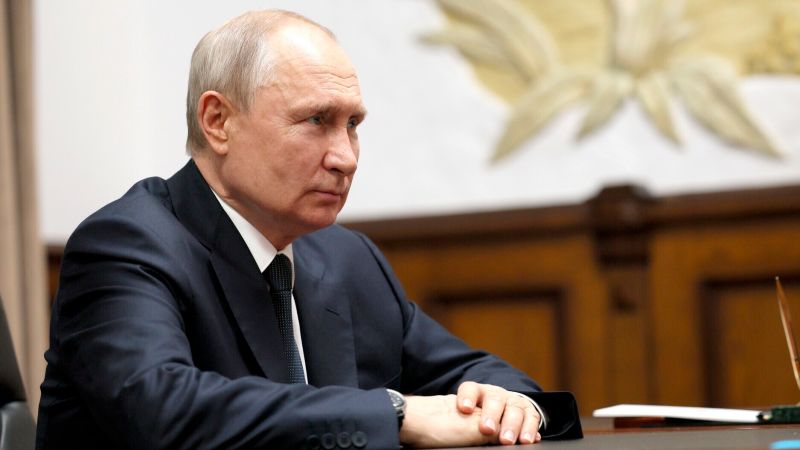Russian President Vladimir Putin’s recent attacks on the port city of Odesa in Ukraine have put the world’s food prices at risk. These strikes are believed to be in retaliation for damage to a bridge connecting Crimea to the Russian mainland. However, they also coincide with Russia’s withdrawal from a yearlong deal known as the Black Sea Grain Initiative, which aimed to keep Ukrainian grain flowing to the global market. This move by Putin has raised concerns about the stability of worldwide food prices.
The attacks on Odesa have been intense, lighting up the night sky and targeting the city’s port, a crucial piece of infrastructure for grain exports. This port was allowed to export grain as part of the deal brokered by the United Nations and Turkey last year.
Adding to the tension, Russia is already feeling the sting of Turkey’s decision to allow Sweden to enter NATO, along with promises from the US to sell F-16 fighter jets to Turkey. Ukraine’s claim of responsibility for the damage to the bridge has further strained relations between the two countries and raised doubts about the future of the grain deal.
In response to these attacks, the US Agency for International Development has announced an additional $250 million in support for Ukraine’s agriculture sector, which plays a crucial role in the global wheat market. This support aims to help Ukraine continue feeding the world amidst the escalating tensions.
The implications of these developments are significant, as they not only impact the relationship between Russia and Ukraine but also have far-reaching consequences for global food prices. Stay informed about this critical issue by signing up for CNN’s What Matters newsletter.Odesa Under Attack: Unprecedented Strikes Shake the City
Odesa, like many Ukrainian cities, has faced its fair share of attacks from drones and missiles. However, the recent onslaught has left residents stunned and fearful for their lives. According to the mayor, these strikes were unlike anything the city has experienced since the start of the war. The intensity of the battle, which lasted over an hour, was relentless and terrifying.
The motive behind these attacks has been a subject of debate. The Kremlin initially claimed it was in response to a bridge attack, but Ukraine President Volodymyr Zelensky believes it is related to a grain deal. The timing is suspicious, as Russia recently pulled out of the agreement, and the strikes caused significant damage to the port. The implications of this are not lost on anyone.
Samantha Power, a former US ambassador to the United Nations, highlighted the disturbing nature of Putin’s disregard for the hungry population during a global food crisis. She emphasized the need for international pressure, especially from countries in sub-Saharan Africa, to address the higher grain and oil prices caused by these attacks.
Power also predicted that Russia would continue targeting critical infrastructure as it faces military setbacks. She described the aggressor’s tendency to attack civilian infrastructure as an easier option for bullies. The situation is dire, and the worst should be expected from the Russian Federation as it struggles on the battlefield.
The consequences of these attacks are not limited to the city of Odesa. Global commodities markets have already witnessed a spike in wheat and corn prices following Russia’s withdrawal from the grain deal. The attacks on Odesa’s ports further exacerbated the situation, diminishing hopes of Russia rejoining the agreement.
The impact of these events on global food security cannot be ignored. Last year, economic shocks, including the Ukraine war and the pandemic, led to acute food insecurity in 27 countries, affecting nearly 84 million people. The collapse of the grain deal will disproportionately affect those on the brink of starvation, according to the International Rescue Committee. UN Secretary General Antonio Guterres also warned that the breakdown of the agreement could turn a crisis of affordability into a crisis of availability for farmers worldwide.
The situation in Odesa is a stark reminder of the devastating consequences of war and geopolitical tensions. As the city continues to bear the brunt of these attacks, it is crucial for the international community to come together and address the urgent need for stability and food security.Turkey’s Role in Brokering Grain Deal with Ukraine and Plans to Host Putin for Talks in August
Turkey has played a crucial role in brokering previous versions of the grain deal between Ukraine and Russia. Now, it is set to host Russian President Vladimir Putin for talks in August. This development has caught the attention of many, as it could have significant implications for the global grain market.
The Importance of a New Grain Deal
Without a new grain deal, Ukrainian grain would have to be transported to ports in Romania or southeastern Europe using railroads. However, this option comes with its own set of challenges. Time and money are major concerns, according to Simon Evenett, a professor of international trade and economic development at the University of St. Gallen in Switzerland. Additionally, ports in Romania are currently undergoing expansion, further complicating the situation.
China’s Role in the Grain Market
China has become increasingly reliant on grain imports from Ukraine. With this in mind, many wonder if Beijing could exert pressure on Russia to reenter the grain deal. This could potentially alleviate the strain on Ukraine and ensure a stable supply of grain for China.
The Impact of Droughts on China’s Food Security
It is worth noting that China has also been grappling with droughts that have affected its domestic grain production. If these droughts prove to be as significant as experts suggest, Beijing may be compelled to put pressure on Russia to reconsider the deal. However, it remains uncertain whether China is genuinely concerned about its own food security needs.
The Future of the Grain Deal
As the situation unfolds, all eyes are on Turkey’s upcoming talks with Putin and the potential for a new grain deal. The outcome of these discussions could have far-reaching consequences for the global grain market and the countries involved. Stay tuned for further updates on this developing story.
The Surprising Impact: Russia’s Influence on Global Food Prices
In recent years, Russia has emerged as a major player in the global food market, with its influence on food prices becoming increasingly significant. This unexpected development has caught the attention of economists and policymakers worldwide, as it has the potential to reshape the dynamics of the global food industry. Understanding Russia’s impact on food prices is crucial for both consumers and producers, as it can have far-reaching consequences on the affordability and availability of essential commodities.
One of the key factors contributing to Russia’s influence on global food prices is its status as a major exporter of agricultural products. The country’s vast land resources and favorable climate conditions have allowed it to become a leading producer of wheat, barley, corn, and other grains. Russia’s agricultural sector has experienced remarkable growth in recent years, thanks to increased investment, modernization, and government support. As a result, it has been able to significantly expand its export capacity, thereby exerting a considerable influence on global food prices.
The impact of Russia’s agricultural prowess is particularly evident in the wheat market. Russia has emerged as the world’s largest exporter of wheat, surpassing traditional powerhouses such as the United States and Canada. This shift in the global wheat trade has had a profound effect on prices, as Russia’s competitive pricing strategy has forced other exporters to adjust their prices to remain competitive. Consequently, consumers around the world have benefited from lower wheat prices, leading to reduced costs for staple food items such as bread, pasta, and cereals.
Furthermore, Russia’s influence on global food prices extends beyond its role as an exporter. The country’s domestic policies and geopolitical considerations also play a significant role in shaping food prices worldwide. For instance, Russia’s decision to impose export restrictions on certain agricultural products during times of domestic shortages can have a ripple effect on global markets. These restrictions, aimed at ensuring food security within the country, can lead to price spikes and supply disruptions in importing nations, particularly those heavily reliant on Russian imports.
Another factor contributing to Russia’s impact on global food prices is its growing influence in the fertilizer market. Russia is one of the world’s largest producers and exporters of fertilizers, particularly nitrogen-based fertilizers. As fertilizers are essential for maximizing crop yields, any disruptions in the fertilizer market can have a direct impact on global food production and prices. Russia’s dominance in this sector gives it significant leverage over global food prices, as it can manipulate fertilizer prices or restrict exports to influence agricultural productivity worldwide.
However, it is important to note that Russia’s influence on global food prices is not without its challenges and risks. The country’s agricultural sector is vulnerable to climate change, as extreme weather events such as droughts and heatwaves can significantly impact crop yields. Moreover, geopolitical tensions and trade disputes can disrupt Russia’s agricultural exports, leading to price volatility and supply uncertainties in global markets.
In conclusion, Russia’s surprising influence on global food prices is a testament to its growing agricultural prowess and strategic positioning in the global food market. As the world’s largest exporter of wheat and a major player in the fertilizer market, Russia’s actions and policies have far-reaching consequences on the affordability and availability of food worldwide. Understanding and monitoring Russia’s impact on food prices is crucial for policymakers, economists, and consumers alike, as it can shape the dynamics of the global food industry and impact the well-being of people around the world.









